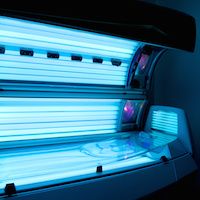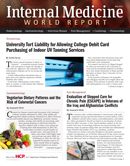Given Risks, Colleges Shouldn't Advertise Tanning Salons
Considering possible legal ramifications, an opinion piece published in JAMA Dermatology has urged universities to cut business ties with tanning salons.

Considering possible legal ramifications, an opinion piece published in JAMA Dermatology has urged universities to cut business ties with tanning salons.
A study has uncovered that 48% of 125 US News and World Report top schools, market on- or off-campus housing with indoor tanning to their student body.
Penned by Arthur Best, JD and his colleagues, the authors claimed while 11 states have banned indoor tanning for individuals under 18, tanning continues to be an activity frequented by college-aged students, with 43% of them using the service within the last year and 59% using it within their lifetime.
Furthermore, research has shown that schools accommodate this pastime, with 14.4% of the 125 top colleges allowing the use of a campus cash card for tanning service payments, which the authors claimed indicates an “endorsement, and possibly even a promotion” for tanning salons by universities.
Contributing to the issue’s seriousness, the investigators claimed indoor tanning has been linked to more than 170 000 cases of non-melanoma skin cancer each year in the US, with this risk being higher among individuals who tan before the age of 25.
Moreover, they cited evidence that tanning before the age of 25 increases the relative risk of non-melanoma cancer to 1.87% (95% CI, 1.41-2.48), rising 1.8% for each session per year.
Due to these universities’ “endorsements,” the authors cautioned that they might be at risk for a lawsuit based on a negligent misrepresentation that leads to a student’s injury. According to Legal Match, negligent misrepresentation occurs when someone doesn't “directly lie, but...made a representation about something while having no reasonable reasons for believing it to be true.”
Acting on the school’s — a figure of authority — promotions, the investigators believe increases the possibility of successfully being sued by a student who is injured by using tanning salons.
“Negligent facilitation of harm might be established with proof that a defendant unreasonably provided an authoritative endorsement of a dangerous activity. Finally, violation of a state consumer protection statute might be a basis for relief based on a defendant’s deceptive endorsement,” they determined.
Since the World Health Organization (WHO) has designated tanning devices’ UV radiation with a class I carcinogenic rating — the same as tobacco smoke — the writers urged schools to end business relationships with tanning salons as it would not only shield them from a lawsuit, but also reduce skin cancer and promote healthy choices to their student body.
